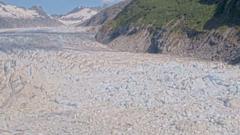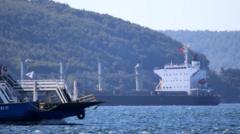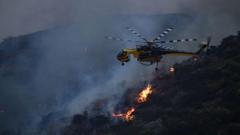As wildfires continue to claim lives and spread across Spain and other southern European nations, the EU has deployed firefighting resources to assist on-the-ground efforts. The situation has escalated with local weather forecasts predicting a prolonged heatwave, worsening wildfire conditions across the region.
EU Mobilizes Support as Wildfires Rage Across Southern Europe

EU Mobilizes Support as Wildfires Rage Across Southern Europe
Spain activates EU's disaster assistance for the first time amid rising wildfire fatalities and extreme heat conditions.
The European Union has dispatched two firefighting planes to Spain in response to the alarming rise of wildfires within the nation, marking the first activation of the bloc's disaster assistance mechanism by Spain. This action comes in light of tragic news as the country recorded its third wildfire-related death on Thursday morning. Forecasters from Spain's state weather agency Aemet warned of sustained heatwave conditions, predicting temperatures to soar as high as 44°C in certain areas, coupled with moderate winds that threaten to exacerbate the spread of the wildfires.
Spain now joins four other countries in Europe seeking assistance against raging wildfires, with Greece already enduring the devastating loss of approximately 25,000 acres of land since the previous Tuesday. The two French Canadair water bombers, which arrived in Spain's northwestern Galicia region, are part of the continued European solidarity efforts, as stated by regional government representative Pedro Blanco: "The fight against fires knows no borders."
Spain's Interior Minister Fernando Grande-Marlaska revealed that the two planes were requested preemptively to bolster Spain's firefighting capabilities. He suggested there might be a need for additional firefighters moving forward. The country mourns the loss of a volunteer firefighter in León, making him the second volunteer casualty in the region and underscoring the grave human costs of these fires, which threaten communities and ecosystems alike.
Since the beginning of the year, wildfires have ravaged over 157,000 hectares of Spanish territory. Furthermore, Spain's Civil Guard has arrested several individuals, increasing the number of arson suspects linked to wildfires to ten since June began. Though weather has contributed to favorable conditions for fire spread, it must be noted that careless activities, such as barbecuing or improperly extinguished cigarette ends, remain significant fire hazards.
In the neighboring nation of Portugal, more than 1,900 firefighters have been mobilized to contend with four major wildfires, with one blaze in Trancoso consuming nearly 14,000 hectares as of the latest reports. The Portuguese government has maintained its state of alert issued last week, extending it through the weekend.
This summer's wildfires represent a growing trend in southern Europe, where rising temperatures linked to climate change amplify the severity of extreme weather events. The EU reports that around 629,000 hectares of land has burned across the continent this year, with Spain accounting for a significant portion.
Similar situations unfold in Greece, Bulgaria, Montenegro, and Albania, which have also utilized the EU's civil protection mechanism. Greece's wildfires have persisted for three days, injuring 95 people, including civilians and firefighters, and driving emergency evacuation efforts to mitigate danger.
Wildfires cross borders, endangering communities and increasing the call for coordinated responses among nations in the face of climate-induced disasters.




















